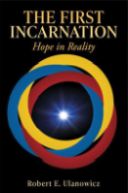The First Incarnation: Hope in Reality
Robert E. Ulanowicz
Xulon Press
2023/149pp.
Paper $15.99/ISBN 13: 978-1-66289-513-5
In The First Incarnation, Ulanowicz is proposing that the very framework of theory in science is in need of adjustment. As an ecosystem theorist, he perceives the origins of causality as residing not only in the microscopic physical realm, but across all scales of reality. He cites reputable physicists as to how the fundamental laws of force, although never broken, can only constrain, but not always determine outcomes in variegated, complex systems. As an ecologist, he emphasizes the importance of processes, which constitute the web of relationships among ecosystem components.
Despite such a radical outlook, the author is no iconoclast. He expects continuing contributions to be made by physicists and geneticists, but stresses the need to import process thinking to supplement the prevailing image of “objects moving according to universal laws”. As a pioneer in the practice of ecosystem network analysis, he guides the reader through a description of phenomena that characterize “how systems are put together”. Along the way he describes behaviors and characteristics of systems that fall beyond conventional physics. In so doing, he begins connecting science with the humanities; melding objective and subjective descriptions of the world; and crossing the trenches that often separate science from religion.
Paramount in his narrative is how configurations of mutual beneficence can facilitate the selection of contingent events that are able to improve the system that incorporates them. Such “choice”, or filtering, constitutes the kernel of the process of “agency”, and he posits that precursors of such agency have been active throughout the evolution of the cosmos since its inception.
Important in Ulanowicz’s treatment of ecological networks is the theory of information, which began by quantifying the absence of knowledge. This formalism allows system dynamics to be viewed as a dialectic between ordering constraints and the lack thereof. Such a Yin-Yan tension in fundamental dynamics has been called, by translators of an author’s earlier book into Chinese, “a bridge” between Asian and Western worldviews.
Looser control of living systems by physical laws affects any number of philosophical and religious tenets. It bears upon contemporary issues, such as the existence of free will, the possibility of Divine intervention, the efficacy of intercessory prayer, and the necessity of theodicy for evolution. It even challenges some of what one theologian has described as an “ontology of despair”, like the purported meaningless “heat death” of the cosmos.
At its core, the thesis of this book rests upon the process of love. In addition to the eternal essences of Thomism, the author encourages a supplementary consideration of the Franciscan emphasis on love. In particular, he highlights St. Bonaventure’s remarkable proposition that “the love shared among the Persons of the Holy Trinity is the origin of all events in the Universe.” Seeing as how mutual beneficence lies at the kernel of the author’s description of agency, it is not much of a reach to envision the agency of the Trinity (The Word) as the prototype of all action. It is as if God gifted God’s own image at the inception of all Creation—the First Incarnation!
To order The First Incarnation, press here.